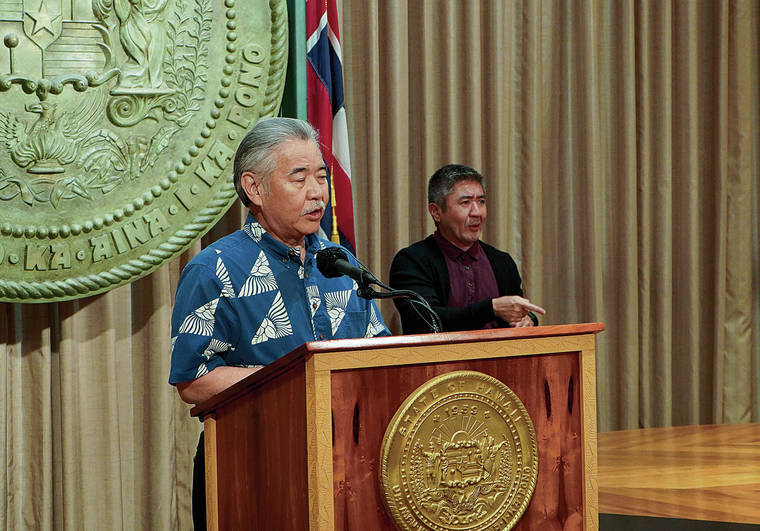Hawaii to begin vaccine passport program for inter-island travel


COURTESY STATE OF HAWAII
Gov. David Ige spoke Tuesday about the state’s vaccine passport program for interisland travel. The program, which is set to begin May 11, will grant exemptions to interisland travelers who have been fully vaccinated in Hawaii.


Traveling between the Hawaiian Islands will get easier next month for people who have been vaccinated in Hawaii, but a major bump in travel demand isn’t likely to come until the entry process for trans-Pacific travelers becomes less complicated.
Gov. David Ige announced Tuesday that Hawaii will begin accepting a vaccination exemption on May 11 for interisland travelers who received their vaccination in Hawaii and have completed the required 14-day waiting period.
Ige’s decision came more than two weeks after the U.S. Centers for Disease Control and Prevention updated its travel guidance to say fully vaccinated people can travel within the U.S. without getting tested for the coronavirus or going into quarantine.
Still, members of Hawaii’s visitor industry said Tuesday that they viewed the state’s limited vaccination exemption program as a good start that hopefully will create a pathway to ease trans-Pacific travel restrictions before summer bookings are lost.
Keith Vieira, principal at KV & Associates, Hospitality Consulting, said, “it’s a positive step that Hawaii is moving in the direction of a vaccination passport and that it’s happening on all islands.”
“Interisland travel spending is way less by nature. There’s lots of people staying and eating at Grandma’s house,” he said. “We still aren’t where we need to be, but hopefully this will make people more comfortable with travelers.”
Don't miss out on what's happening!
Stay in touch with breaking news, as it happens, conveniently in your email inbox. It's FREE!
Mufi Hannemann, president and CEO of the Hawaii Lodging & Tourism Association, said the advantage of first easing restrictions for kamaaina travelers is that it allows residents to see that tourism is for their benefit. Hannemann said the slow approach helps to address some of the resident hostility and dissatisfaction toward tourism that emerged during the pandemic.
“It’s important that our visitors continue to feel welcome,” Hannemann said. “There’s no denying that pent-up demand is still there, and part of the reason is that the people who are coming are having a great time. We’re hearing that and the surveys are showing that.”
Jim Braman, general manger of The Cliffs at Princeville, said getting to the point where the state and community feel comfortable with easing restrictions for vaccinated kamaaina travelers has been a long time coming.
“We do good interisland business now, and I think this will be a great reason for people to travel and celebrate, so we have high hopes for the next couple of months with this,” Braman said. “Once it opens to the mainland, it will have a huge impact. It will allow us to have all of our employees back to work. It will get us back to normal with occupancy, and as important as all that is, it trickles down to the businesses that depend on visitors coming.”
Braman said he supports the state’s phased-in approach to loosening travel restrictions but said Hawaii needs to loosen trans-Pacific travel restrictions before summer or risk losing another peak travel season.
“We’ve got people that have forward bookings for six months from now that are betting on a vaccination exemption,” he said. “They’ll cancel if that doesn’t happen, and we’ll have to refund the money. It would just be terrible if Hawaii loses summer again.”
Ige said state and county mayors decided to start the vaccination exemption program with those who had been vaccinated in Hawaii because “we can verify the information and their vaccination status.”
Ige said the phased approach would allow officials to “validate the screening process.” He said it also would allow the state and counties to “learn about what kinds of bottlenecks and delays it may inject into our screening process for interisland travel.”
“We are monitoring and continue to monitor the rate of virus activity in our community, hospitalizations and fatalities here caused by COVID-19,” Ige said. “Our No. 1 priority remains protecting the health and well-being of Hawaii’s citizens. We continue to work to improve the systems and programs in order to keep our community safe and reenergize our economy.”
Hawaii’s new vaccination exemption allows qualifying interisland travelers to bypass the state’s 10-day travel quarantine without going through the Safe Travels Hawaii pre-testing program or post-arrival county testing.
But the program doesn’t yet allow travelers who were vaccinated in Hawaii and are entering Hawaii on trans-Pacific flights to be exempt from the quarantine. Unvaccinated children age 5 and above who are traveling with qualifying interisland travelers also will need to get a pre-test.
Qualifying interisland travelers may begin entering their vaccination information into Safe Travels Hawaii, travel.hawaii.gov, on May 7 for travel on or after May 11.
Ige said the state isn’t likely to expand vaccination exemptions to domestic trans-Pacific travelers until summer. International travelers from nations such as Japan, South Korea, Taiwan, New Zealand, Australia and Canada would be added later, Ige said.
The vaccination exemption isn’t replacing the Safe Travels Hawaii travel pre-testing program, travel.hawaii.gov, which will still be available to travelers who do not qualify for the exemption.
Unvaccinated and trans-Pacific travelers may bypass a 10-day mandatory quarantine period if they comply with the Safe Travels pre-testing program.
The pre-testing program still requires that travelers complete a nucleic acid amplification test administered by one of Hawaii’s approved trusted testing partners, hawaiicovid19.com/travel-partners. The test must be taken within 72 hours before departure of the final leg of their trip to Hawaii.
All counties are now part of the Safe Travels Hawaii pre-testing program since Kauai rejoined on April 5, and all are slated to join the state’s interisland vaccination exemption program for those vaccinated in Hawaii. However, state policies might differ from county requirements, so travelers should check for county updates before visiting.



